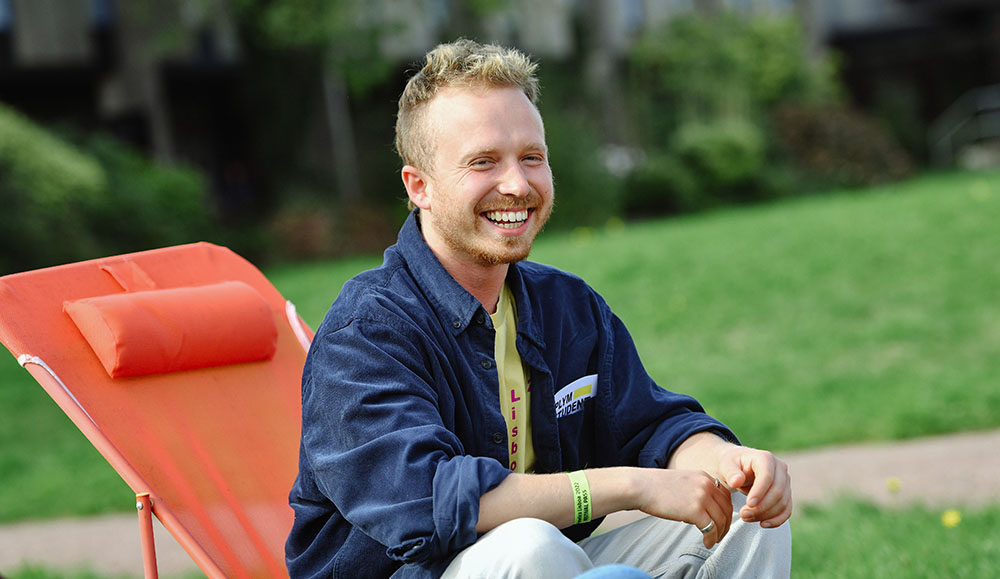Karen: The specialist study skills tutor is there to provide individualized support to new and existing students for those who feel they may have specific learning difficulties such as dyslexia, dyspraxia, or autism.
Beth: I just thought I was probably not as clever as everybody else. And spelling I knew was a problem, but I didn't really even think it would be dyslexia, I just thought, but I've missed something and that I couldn't spell very well, so I covered it up. And I think when you're in secondary year at school, you cover it up by using different words, simple words. And when you're in certain jobs, you get a group of words or language that you use and you learn to do that. And then you don't really deviate.
Charlotte: Through school I've always struggled. And then I came to Marjon still struggling, and I decided to go to the student support office and ask them if there was any support available and they were like, "Oh, well you can have a screening." And then I went for a screening and then found out that, yeah, I was dyslexic.
Karen: If for many students, they may feel that they've had some issues with writing, and it really comes to the forefront when they start academic studies and different skills are required of them. And that might be in the form of feedback from some of their first essays and assignments from tutor saying that there's some difficulties with sentence structures, or coherent arguments, or planning an essay. And then that can lead to a lot of frustration for the student, that might be when they come to us. And it might be from lecturers or it might be self-referral from the student and we'll talk them through some of the issues that they may be having. And a lot of them may be common indicators of something like dyslexia.
Heather: And students are able to self-refer for a dyslexia screen. And that's normally with me or one of my colleagues, and we'll just go through the informal discussion regarding the things that they're finding difficult and what their strengths are as well. And then we'll be able to point them in the right direction for their studies.
Charlotte: To be honest, that that was a bit like, I felt very anxious because there was this strange person that I didn't know, but I was like, Oh, what's going to happen, the fear of the unknown, but actually it was fine. The person who did it sat through with me and explained what was going to happen and it didn't take that long. And he was like, "Oh, if you are dyslexic, then these are the strategies that we can use to put in place."
Karen Griffiths: Some of the practical skills that we can help with are things like breaking down the assignment title into manageable chunks, understanding the words, the terminology that's used, planning the time, organizing the time, things like memory revision skills, working towards exams, short term memory. There's lots of strategies. We've got a little toolkit, well a big toolkit actually, of lots of helpful advice and expertise in the whole team. And we all offer various different aspects to that, and we have something, hopefully for everybody.
Beth: I had no idea at all, and then near the end of my first year, my tutor felt that my ability in class didn't match my written ability and asked me if I would consider going to student services and perhaps running a test, the screening for dyslexia, which I did. And it came back that I did have some sort of strong dyslexia. And then through that, I've been offered support. So I had sort of computer software, computer and the software put on that, that sort of helped me plan and think about different things, also spelling programs. And then you get 30 hours support one-to-one with a specialist, so I had Karen and yeah, it made a huge difference really. It just made me realize that I could unmuddle my brain and it was okay and it didn't matter that it was too muddled. There was a different way of doing things.
Heather: Many of our students come to us with their dyslexia as a negative, and we're able to work together with their confidence and then turn their dyslexia into a positive.
Charlotte: It's really helped because since I've accessed support my grades have improved, and because my grades have improved, my confidence has improved.
Beth: Just think I'm not daft really. And made me think, Oh, I'm quite clever, there's certain things I can do. And it gives me confidence in what I'm saying and what I'm thinking. I think I've learned to realize that I can have some quite complex ideas and it's just different ways of looking at them. I think I'm quite patient with other people. I think I'm just more aware that there's different parts of doing things, and I think that helps in any field.

 External Providers Info Pack
External Providers Info Pack
 NMH Rates 2024-25
NMH Rates 2024-25
 Support for Dyslexia and other Specific Learning Difficulties (SpLDs)
Support for Dyslexia and other Specific Learning Difficulties (SpLDs)
 DSA1 Application (Long Form) 2023-24
DSA1 Application (Long Form) 2023-24
 DSA Slim Application (Short Form) 2023-24
DSA Slim Application (Short Form) 2023-24
 Notes on applying for DSA 2023-24
Notes on applying for DSA 2023-24
 DSA expenses claim form 2023-24
DSA expenses claim form 2023-24
 DSA medical evidence form
DSA medical evidence form
